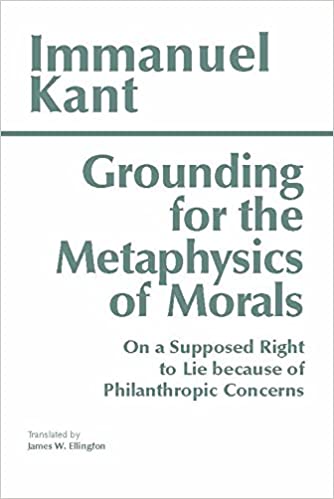This Grounding is, however, intended for nothing more than seeking out and establishing the supreme principle of morality.
Immanuel Kant

Groundwork for the Metaphysic of Morals
Immanuel Kant

A reliable and inexpensive paperback version, from which quotations included here are taken, is the translation by James W. Ellington, published by Hackett, ISBN 0-87220-166-X A good, free online version of this translation is available on the Early Modern Texts website, here:
...one should act in such a way that one could will the principle of one’s action as a universal law.
As the above quote makes clear, the goal of Kant’s Grounding for the Metaphysics of Morals is to provide a single, overarching principle for all of morality. He calls this principle, which may be formulated in a number of different ways, the categorial imperative. According to this imperative, one should act in such a way that one could will the principle of one’s action as a universal law. Kant asserts that this imperative is based in our autonomy – by which he means it is an imperative imposed by reason on itself, rather than by any outside force. An ideal moral community living according to this imperative would be a “kingdom of ends” – which to say that in such a community every member would be treated as an end rather than as a means to some other goal. We may put laws and other positive or negative incentives in place that will encourage people to act according to the categorical imperative, but the only genuinely worthy actions are those that are taken without any heteronomous influence; they proceed rather from a good will alone – or to use Kant’s language, they are actions that proceed neither from compulsion nor from inclination, but from duty.
Why This Text is Transformative?
...the overall goal – to find one, single principle that can be a key to deciding questions of morality – is one that students find relatable.
Kant is notoriously difficult to read and, although it was intended for a more general audience than some of his other works, the Grounding is no exception. Still, the overall goal – to find one, single principle that can be a key to deciding questions of morality – is one that students find relatable. Who hasn’t struggled to find clarity, or wished for a principle about which we could all agree, when considering issues of right and wrong? Whether or not one ends up in agreement with Kant, his attempt to identify and defend such a principle, and relate it both to individual freedom and to the form of an ideal society, can give all of us a chance to talk about the goal itself (Why might such a single principle be desirable? Be problematic?) and about our own ways of thinking through and clarifying moral questions. (Kant grounds his approach in the ideal of human freedom. If not freedom, what might you take as a starting point for grounding morality?)
A Focused Selection

The text is extremely dense, so that even a short selection can take some time to read and work through. In section one, at paragraph numbers 402 to 404 (pp. 14 and 15 in the Hackett edition) there is a brief section in which Kant first state a formulation of the categorical imperative (“I should never act except in such a way that I can also will that my maxim should become a universal law.”) and then uses it as a principle to work through an approachable example: when I am in real trouble, is it ever okay to lie or to make a promise that I don’t intend to keep? Students will probably have a variety of their own intuitions about the answer to this question, and may also have given some thought to how they might justify their positions. This makes it easier to see what’s at stake in Kant’s own thinking through of the question, as his position and justifications may either support or run counter to their own. At the end of this brief section, Kant also makes the claim that the principle he calls the categorical imperative is found within the cognition of “ordinary human reason.”
Study Questions
1) Do you think that there is or should be one principle that underlies morality in all times and places? If not, how is it possible to condemn various forms of oppression and injustice? Couldn’t they just be reflective of different sets of values? If so, why do moral judgements seem to differ so greatly across cultures, times, and positions in hierarchies of power?
2) Kant takes human freedom, autonomy, as a starting place for understanding morality. Only actions willed through freedom can be understood to be fully moral. Does this make sense to you as a starting point? Is there some other element of what it is to be human that you would place over freedom? Can we really ever act (or know whether we are acting) out of freedom?
3) Are actions taken out of respect for duty more worthy than similar actions undertaken for some other motive? How much of the value of an action is derived from its consequences as opposed to the will that gave rise to it?
4) Kant ends this brief section by saying that the principle he articulates as the categorical imperative is found, in different formulations, in common human reason. Do you agree?
Building Bridges
A Recommended Pairing
Interesting connections can be drawn between Kant’s Grounding for the Metaphysics of Morals and any text that gives some universal principle for moral reasoning. Many religious traditions propose some version of what is commonly know as “The Golden Rule.” In the New Testament it is commonly formulated as something like “Treat others as you would like to be treated yourself;” in the Jewish Talmud, “What is hateful to yourself do not do to your neighbor;” or, in the Hadith of the Prophet Mohammed in Islam “Wish for others what you wish for yourself.” Would you agree that all these principles come down to the same thing as one another – and as the categorical imperative? If not, why not? If so, is there an advantage to stating it one way or another?
Supplemental Resources

A Sculpture to Mary Wollstonecraft in Newington Green, London. It was sculpted by British artist Maggi Hambling. It was unveiled on November 10, 2020.By Grim23 - Own work, CC BY-SA 4.0
What did Mary Wollstonecraft write about in A Vindication of the Rights of Woman?
Dangerous Minds Episode 4 - Mary Wollstonecraft
Text Mapping
Discipline Mapping
Philosophy & Religion
Humanities
Area Studies
Page Contributor



